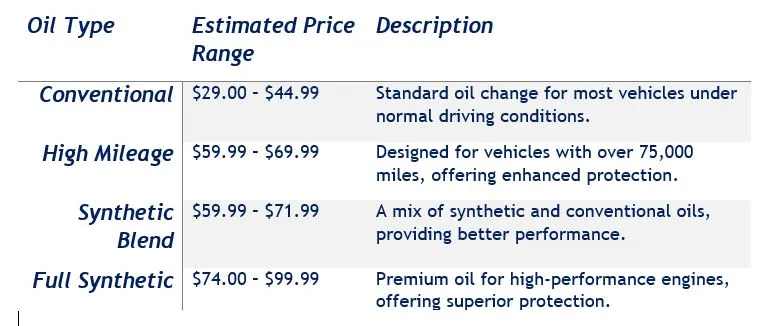Overview
Changing the oil in your BMW is one of the most important maintenance tasks you can perform.
It ensures that your engine runs smoothly, efficiently, and at optimal performance. But how much does
a BMW oil change cost? Well, that depends on several factors, and in this article, we’ll break down what to
expect, the variables that affect the cost, and how to make sure you’re getting the best value for your investment.
The Basics of BMW Oil Changes
For BMW owners, the oil change isn’t just about replacing the oil. It’s an essential service that helps to maintain
the engine’s health and performance over time. Unlike regular sedans or economy cars, BMW vehicles typically require
synthetic oil, which offers better protection for the engine, especially for high-performance models like the M series or X series.
A BMW oil change is designed to keep the engine clean, reduce friction, and protect against corrosion, all while improving
fuel efficiency. With this in mind, let’s look at what factors influence the cost of an oil change for your BMW.
Factors Affecting BMW Oil Change Cost
Type of BMW Model
The first thing that affects your oil change cost is your specific BMW model. A standard BMW 3 Series
oil change won’t cost as much as an oil change for a high-performance model like the BMW M5.
The larger and more powerful the engine, the more oil is required, which increases the price.
Additionally, performance-focused engines may require premium synthetic oils that are pricier than
regular synthetic oils used in standard models.
Oil Type and Quality
BMW recommends using synthetic oil for all of its models, and for a good reason. Synthetic oil
is specially formulated to handle the high-performance demands of BMW engines. The cost of
synthetic oil is typically higher than conventional oil, and if you’re driving a performance model, BMW
may recommend even more advanced options, such as fully synthetic or long-life oils, which can raise
the cost further.

Dealership vs. Independent Shops
The cost of an oil change at a BMW dealership varies based on the dealership and its location. BMW stores
typically charge more for oil changes because they utilize high-quality oils and use specialized technicians
who are particularly trained to operate on BMW automobiles. This premium service at the dealership guarantees
that your vehicle is maintained in accordance with the manufacturer’s exact requirements, so preserving its
performance and lifespan. Independent businesses may provide reduced prices for oil changes, but the quality
of service and parts utilized may vary. While an independent shop may be less expensive, it is critical to check
that the quality of servicing matches your vehicle’s requirements for best performance.
BMW Dealership Oil Change Costs
Average Price: Typically ranges from $135 to $175, depending on the model and services included.
service Details:
Utilization of premium synthetic BMW-approved oil.
Replacement of the oil filter.
Comprehensive multi-point inspection of the vehicle.
Example:
At Patrick BMW, oil changes are priced as follows:
$119.99 for 4- and 6-cylinder models.
$149.99 for 8-cylinder models.
$179.99 for M and diesel models.
cost of oil change service:
Jiffy Lube Oil Change Costs
Pricing:
Full synthetic oil changes typically cost between $79.99 and $89.99, depending on the vehicle and location.
Tires Etc
Service Details:
Includes up to 5 quarts of Valvoline full synthetic oil.
Replacement of the oil filter.
Lubrication of chassis components as per manufacturer specifications.
An 18-point maintenance check, covering items like air filter, battery, brake fluid, tire pressure, and more.
note: Some BMW owners have reported concerns about the use of non-OEM parts and the
adequacy of service for luxury vehicles.

Valvoline Instant Oil Change Costs
Pricing:
Full synthetic oil changes are priced around $79.99, with potential discounts bringing the cost
down to approximately $59.99. Patrick BMW+2Tires Etc+2COR Wheels+2
Service Details:
Includes up to 5 quarts of Valvoline full synthetic oil.
Replacement of the oil filter.
Lubrication of chassis components as per manufacturer specifications.
An 18-point maintenance check, covering items like air filter, battery, brake fluid, tire pressure, and more.
note: Some customers have experienced upselling of additional services, leading to higher-than-expected bills.
Additional Services
- Many dealerships offer additional services with an oil change, such as fluid top-ups, tire checks, air filter replacement, and brake inspections. These services can increase the overall cost of the oil change. Some independent shops may offer similar services at a lower cost, but the quality of the work might not always be the same.
| Service Provider | Estimated Cost (USD) | Oil Type | Additional Services Included |
|---|---|---|---|
| BMW Dealership | $135 – $175 | Premium Synthetic BMW-approved Oil | Oil filter replacement, multi-point inspection, check of fluids, brake systems, tire pressure, etc. |
| Jiffy Lube | $79.99 – $89.99 | Valvoline Full Synthetic Oil | Oil filter replacement, chassis lubrication, 18-point maintenance check (air filter, battery, brake fluid, tire pressure, etc.) |
| Valvoline Instant Oil Change | $79.99 | Valvoline Full Synthetic Oil | Oil filter replacement, chassis lubrication, 18-point maintenance check (air filter, battery, brake fluid, tire pressure, etc.) |
Average BMW Oil Change Costs
So, how much does an oil change for your BMW typically cost? The price range can vary, but here’s
an approximate breakdown:
BMW 1 Series:
$100 – $150
BMW 3 Series:
$100 – $200
BMW 4 Series:
$100 – $200
BMW 5 Series:
$150 – $250
BMW 6 Series:
$150 – $250
BMW 7 Series:
$200 – $300
BMW X1:
$120 – $180
BMW X3:
$120 – $200
BMW X4:
$150 – $250
BMW X5:
$150 – $250
BMW X6:
$150 – $250
BMW Z4:
$150 – $250
BMW i3 / i4 / i8 (Electric and Hybrid models):
$50 – $150 (since some may not require traditional oil changes, but maintenance
for the battery and fluid levels is required)
BMW M Series (M3, M4, M5, M6, etc.):
$150 – $300 (higher due to performance oils and specialized service)
Pros of BMW Oil Changes
- Synthetic Oil Use: BMW typically uses synthetic oils, which last longer than conventional oils. This means you may need fewer oil changes over the lifespan of the car.
- Better Engine Performance: The high-quality oils and the specific service ensure optimal performance of the engine.
- Maintains Warranty Coverage: Getting your oil changed at authorized centers ensures you meet maintenance requirements to keep the warranty valid.
- Specialized Service Centers: BMW dealerships or certified mechanics are familiar with your car’s unique needs, ensuring a higher level of care.
- Higher Resale Value: Maintaining regular oil changes and records can help preserve the vehicle’s value when reselling.
Cons of BMW Oil Changes
- Higher Costs: As a luxury vehicle, BMW oil changes are more expensive than standard cars, largely due to the use of premium synthetic oil.
- Potential for Over-Maintenance: BMW recommends oil changes at intervals based on a combination of time and mileage, which may be perceived as more frequent maintenance than some other vehicles.
- Specialized Mechanics: Not all service centers are equipped to handle BMW-specific oil changes and may require trips to specialized shops or dealerships, potentially causing inconvenience.
- Expensive Parts and Oil: Some BMW models require a specific brand of oil or parts that can be costly compared to generic options.
FAQs about BMW Oil Changes
How often should I change the oil in my BMW?
- BMW recommends an oil change every 10,000 to 15,000 miles for most models, but it depends on your driving habits, type of oil used, and the model. Always check your owner’s manual for exact intervals.
Can I use regular oil instead of synthetic oil?
- BMW recommends using synthetic oil for its cars. While it’s technically possible to use regular oil, it can harm your engine’s performance and may void warranties.
Can I change the oil myself in a BMW?
- While it is possible to change your own oil, it’s not recommended unless you have the proper tools and knowledge. BMW engines can be complex, and using the right oil and parts is crucial for maintaining the engine’s performance.
What is the BMW oil change price difference between doing an oil change at a dealership vs. an independent shop?
- Typically, dealership oil changes will be more expensive due to labor costs and the use of OEM (original equipment manufacturer) parts and oils. Independent shops may be less expensive, but be cautious about the oil and parts they use.
Do hybrid or electric BMW models need oil changes?
- Hybrid or electric models like the BMW i3 and i8 generally do not need oil changes like traditional gasoline-powered cars. However, they still require regular maintenance for battery health, cooling fluids, and other system checks.
What happens if I don’t change my oil regularly?
- Not changing the oil regularly can lead to sludge buildup in the engine, increased friction, overheating, and ultimately engine damage, which can be costly to repair.
7. How much does oil change cost for BMW?
An oil change for a 2024 BMW X3 typically ranges between $215 and $253 USD.
This estimate includes both parts and labor, with parts generally costing between $154 and $163, and labor ranging from $61 to $90 The M40i’s turbocharged engine demands high-performance synthetic oil to maintain its power and efficiency, ensuring that the engine remains responsive and well-protected during spirited drives.
The cost of an oil change for a BMW X3 M40 in the United States typically ranges from $150 to $250.
These prices are based on using high-quality synthetic oils and standard labor charges.
Keep in mind that prices can fluctuate depending on location, the specific BMW model, and any promotions or discounts available at the time.
8. How much does a BMW oil change cost in Canada?
On average, an oil change at a BMW dealership costs between $100 and $250. This cost usually includes oil, labor, and a new oil filter.
BMW 3 series oil change cost:
An oil change for a BMW 3 Series typically costs between $150 and $250 at a dealership, which includes the oil, labor, and replacement filter. Independent shops may offer lower pricing, maybe in the $100 to $200 range, but it is critical to ensure they utilize BMW-approved oil and parts.
Dealership:
Expect to pay between $163 and $192, with the possibility of greater prices for more extensive procedures or special oil kinds.
Independent Shop:
Costs might range from $100 to $200, but it’s critical to ensure they utilize BMW-approved parts and supplies.

DIY Oil Change vs. Professional Service
If you’re a DIY enthusiast, you may wonder if you can save money by changing the oil yourself. While changing the oil in a BMW isn’t an impossible task, it’s not as simple as doing it on a regular economy car. BMW engines have tight tolerances, and working on them requires specific knowledge, tools, and the right oil. Plus, there’s the potential risk of voiding your warranty if you don’t follow the manufacturer’s recommended oil change intervals and procedures.
If you do decide to go the DIY route, be sure to use high-quality synthetic oil that meets BMW’s specifications. You’ll also need an oil filter and the appropriate tools, which can add to the initial cost of the oil change. All things considered, the cost of doing it yourself could range from $50 to $100, but you’ll still need to factor in your time and the potential for mistakes if you’re not familiar with the process.
You can save money by doing it yourself, with costs for oil and filter typically around $80, according to a forum post.
Why Choose Professional BMW Oil Change Services?
While a DIY oil change might seem like a cost-saving option, there are several advantages to opting for professional BMW oil change services. Here are a few reasons why you might want to stick with a certified technician:
- Expertise and Experience: Certified BMW technicians have in-depth knowledge of the brand’s vehicles. They understand the complexities of the engine and know exactly what type of oil and filters to use.
- Genuine Parts and Fluids: BMW technicians use only genuine BMW parts and fluids that are specifically designed for your vehicle. This ensures that your car’s engine is getting the protection it needs for longevity and performance.
- Comprehensive Service: When you go to a professional BMW service center, they don’t just change the oil. They perform a multi-point inspection to ensure that your car is in good working condition. This could catch any potential issues early on, saving you money in the long run.
- Warranty Protection: Having your BMW serviced at a dealership ensures that the work is completed accurately and in accordance with BMW’s specifications, thereby retaining your warranty.
How Often Should You Change the Oil in Your BMW?
Now that we’ve covered the cost of a BMW oil change, you might wonder how often you need to change the oil in your car. BMW typically recommends changing the oil every 10,000 to 15,000 miles, but this can vary depending on the model, driving conditions, and the type of oil used. Some drivers might opt for more frequent oil changes for added peace of mind, especially if they drive their BMW under heavy conditions (frequent short trips, towing, or aggressive driving).
Final Thoughts
Regular oil changes are vital for keeping your BMW engine in good working order, assuring its performance, lifespan, and driving enjoyment. Use high-quality synthetic oil from a dealership or an independent shop, and seek professional guidance from a BMW dealership or qualified technician in your area. This guarantees your BMW continues to provide an exciting driving experience.
By keeping up with regular maintenance and oil changes, you can guarantee that your BMW continues to give you with the exhilarating driving experience it was meant for, mile after mile.









